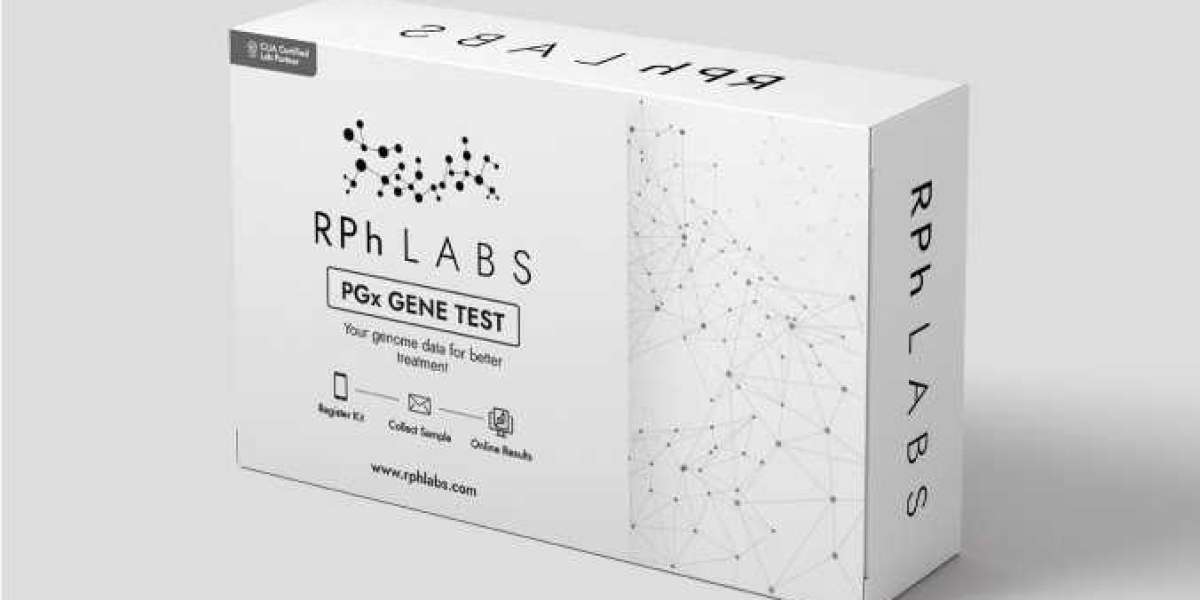Pharmacogenomics (PGx) is transforming the landscape of healthcare by tailoring drug treatments to the genetic profile of individual patients. A PGx testing kit enables healthcare providers and patients to determine how certain genetic variations may affect a person’s response to medications, helping to reduce adverse reactions, optimize dosage, and improve overall efficacy. With the increasing accessibility of PGx testing kits, it’s important to understand their potential benefits, uses, and considerations. This article will cover everything you need to know about PGx testing kits, providing insights into how they work, who they’re for, and the key factors for choosing the right kit.
What is a PGx Testing Kit?
A PGx (Pharmacogenomics) testing kit is a tool designed to analyze a person’s genetic makeup to provide insights into their likely response to various medications. These kits generally involve collecting a DNA sample—often through a simple cheek swab—which is then sent to a laboratory for analysis. The resulting genetic profile helps healthcare providers make informed decisions regarding medication selection and dosing, minimizing potential side effects and enhancing therapeutic outcomes.
Pharmacogenomics lies at the intersection of genetics and pharmacology and plays a critical role in personalized medicine. By understanding genetic variations that affect drug metabolism and response, PGx testing kits can help tailor medications to individual patients, potentially improving efficacy and reducing adverse reactions.
How Does PGx Testing Work?
PGx testing kits typically involve a straightforward process:
- Sample Collection: A DNA sample is obtained, usually through a saliva sample or cheek swab. Some advanced kits may require blood samples for more comprehensive testing.
- DNA Analysis: The collected DNA is analyzed in a certified laboratory, where scientists look for specific genetic markers associated with drug metabolism and response.
- Report Generation: A detailed report is generated, providing insights into various genetic variants. This report typically includes information on which medications are likely to be effective, which may cause adverse effects, and what dosage might be optimal.
- Clinical Interpretation: Physicians or genetic counselors review the PGx test report to make medication recommendations tailored to the patient’s genetic profile.
The test results can reveal essential insights into enzymes such as CYP450, which plays a significant role in drug metabolism. For example, genetic variations in CYP2D6 and CYP2C19 enzymes can affect how well certain antidepressants, antipsychotics, or pain relievers work.
Benefits of PGx Testing Kits
1. Personalized Medication Management
One of the key benefits of PGx testing kit is the ability to personalize medication plans. Genetic testing reveals which drugs are likely to be most effective for an individual and at what dosage, potentially enhancing outcomes for chronic conditions like depression, anxiety, and cardiovascular diseases.
2. Reduced Risk of Adverse Drug Reactions
Adverse drug reactions (ADRs) are a major concern in healthcare, leading to thousands of hospitalizations each year. PGx testing can significantly reduce the risk of ADRs by identifying medications that may not be suitable based on genetic predispositions, particularly for drugs with a narrow therapeutic index.
3. Enhanced Drug Efficacy
With PGx testing, healthcare providers can avoid the trial-and-error approach in prescribing medications. This reduces the time required to achieve effective treatment outcomes, as the patient receives drugs that align well with their genetic profile from the beginning.
4. Informed Dosage Adjustments
Understanding how a patient’s body metabolizes drugs can aid in determining the correct dosage. PGx testing allows for precision dosing, which is crucial for medications that require fine-tuning to avoid toxicity or ineffective low doses.
Who Should Consider a PGx Testing Kit?
PGx testing can benefit a wide range of individuals, especially those who:
- Have a History of Adverse Drug Reactions: Individuals who have previously experienced unusual or severe reactions to medications may benefit from PGx testing.
- Take Multiple Medications (Polypharmacy): Those on multiple drugs can use PGx testing to identify potential drug-drug interactions and determine the safest and most effective treatment regimen.
- Have Chronic Health Conditions: People with long-term conditions such as mental health disorders, cardiovascular diseases, or chronic pain may experience better outcomes through PGx-guided medication choices.
- Are Starting a New Medication Regimen: For patients beginning treatment with potentially complex or high-risk medications, PGx testing can provide a baseline for selecting the most appropriate drugs and dosages.
Common Genes Analyzed in PGx Testing
PGx testing kits focus on several important genes that play a role in drug metabolism and efficacy. Some commonly analyzed genes include:
- CYP2D6: Influences the metabolism of many drugs, including antidepressants and opioids. Variants in this gene can lead to poor, intermediate, extensive, or ultra-rapid drug metabolism.
- CYP2C19: Affects the metabolism of drugs like proton pump inhibitors, antidepressants, and blood thinners.
- SLCO1B1: A gene associated with statin metabolism, which is critical for patients on cholesterol-lowering drugs.
- VKORC1: This gene affects sensitivity to warfarin, an anticoagulant, and helps determine appropriate dosing.
- TPMT: Important for patients taking thiopurine drugs, often used in treating autoimmune diseases and cancers.
These genes help clinicians tailor prescriptions, avoid ineffective drugs, and reduce the risk of adverse side effects.
Key Considerations When Choosing a PGx Testing Kit
1. Comprehensive Gene Coverage
Ensure that the PGx testing kit you choose covers a wide array of genes relevant to the medications you may be prescribed. Some kits only focus on a limited number of genes, which might not provide the full picture for effective medication management.
2. Laboratory Certification
Select a kit processed in a CLIA-certified (Clinical Laboratory Improvement Amendments) and CAP-accredited (College of American Pathologists) laboratory to ensure the accuracy and reliability of results.
3. Ease of Use and Collection Method
Most PGx testing kits use non-invasive cheek swabs, but some may require saliva or blood samples. Choose a kit that aligns with your comfort level and provides easy-to-follow instructions for sample collection.
4. Detailed Reporting and Interpretation
A good PGx testing kit should offer a detailed, easy-to-understand report. Some kits provide only the raw genetic data, while others include actionable insights and recommendations. Look for kits that provide clinical-grade reports, ideally with options for healthcare provider interpretation.
5. Support and Follow-Up Care
Consider kits that offer access to genetic counselors or healthcare professionals who can help interpret the results and guide next steps. The best PGx testing companies provide resources and support for understanding and acting on test results.
6. Cost and Insurance Coverage
While PGx testing can be costly, some health insurance plans may cover part or all of the cost if deemed medically necessary. It's worthwhile to check with both the testing provider and your insurance company to understand the pricing and reimbursement options.
Popular PGx Testing Kits on the Market
Some leading companies in PGx testing offer reliable kits for both direct-to-consumer and healthcare provider use. Here are a few notable names:
- GeneSight: Provides insights into medications for mental health conditions, focusing on antidepressants and antipsychotics.
- OneOme RightMed: Covers a wide range of drugs, including those for cardiovascular, mental health, and pain management.
- Genomind: Known for its mental health-focused PGx testing, analyzing over 24 mental health-related genes.
- MedTek21: Offers a comprehensive approach that includes drug-to-gene and drug-to-drug interaction checks.
These kits vary in terms of scope, available support, and pricing, so it’s crucial to assess your specific needs and consult your healthcare provider.
The Future of PGx Testing: Integrating Genetics into Routine Care
As PGx testing becomes more accessible, it is poised to revolutionize medication management and personalized healthcare. The field of pharmacogenomics continues to expand, with research uncovering new gene-drug interactions that could further enhance patient care. We can expect future PGx testing kits to become more affordable, covering an even broader spectrum of genes and providing more detailed insights for individualized treatment plans.
By adopting PGx testing, healthcare providers can move towards a more personalized approach, reducing the risks of adverse drug reactions, improving medication efficacy, and optimizing patient outcomes. Integrating PGx testing into standard medical practice could not only save lives but also reduce healthcare costs associated with trial-and-error prescriptions.
Conclusion
PGx testing kits represent a significant advancement in personalized medicine, offering tailored solutions that improve drug efficacy and minimize adverse reactions. From patients with chronic conditions to those navigating complex medication regimens, the benefits of PGx testing are far-reaching. By understanding how your genetic makeup interacts with specific medications, you can take control of your health and work with your healthcare provider to choose the safest, most effective treatments.
Investing in a PGx testing kit is more than just a genetic test; it’s a proactive step toward a future where healthcare is as unique as each individual.


